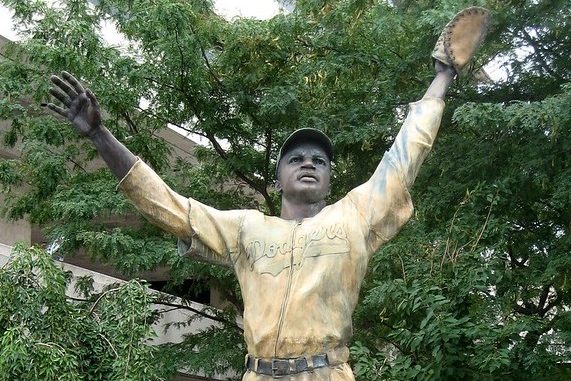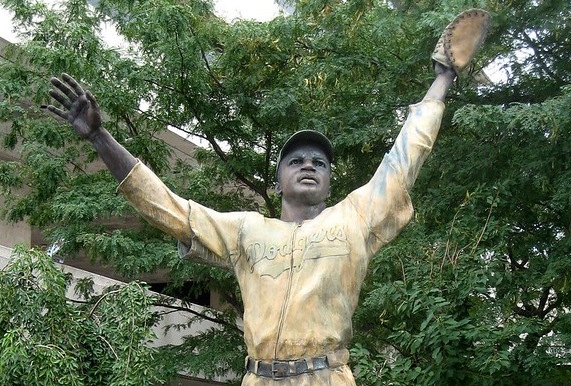

Don’t let Leftist social media shut us out! Sign up for Daily Surge’s daily email blast… it’ll keep you updated on each day’s Daily Surge new columns. Go to dailysurge.com and sign up under “Free Newsletter” on the right side of the page, one-third of the way down. It’s easy! And like it says, it’s free!
Surge Summary: On and off the baseball diamond, Jackie Robinson blazed a path of equal rights for African Americans and helped change the face of America.
by Dr. Gary Scott Smith
To celebrate Black History Month this February, we could highlight the significant contributions of dozens of African American physicians, lawyers, scientists, intellectuals, and entertainers who have attacked racial discrimination, substantially improved the world, and helped elevate the reputation of their race.
Scientist and inventor George Washington Carver, Tuskegee Institute founder Booker T. Washington, professor and author W. E. B. DuBois, college founder and president Mary McLeod Bethune, social activists Frederick Douglass and Martin Luther King, Jr., Supreme Court justice Thurgood Marshall, ministers Vernon Johns and Howard Thurman, labor union leader A. Philip Randolph, and President Barack Obama stand out. The achievements of poets Paul Laurence Dunbar and Langston Hughes, contralto Marian Anderson, trumpeter and composer Louis Armstrong, composer and orchestra leader Duke Ellington, singer and pianist Nat King Cole, author Richard Wright, actors Paul Robeson, Lena Horne, and Sidney Poitier are also very impressive.
The contribution of black athletes has also been remarkable and inspiring. They have inspired millions of minority group members to battle for social equality and pursue their dreams in many areas of society, and sports have helped to increase racial understanding.
Four African Americans who starred in various sports during the late 19th and first half of the 20th centuries blazed the trail: bicyclist Major Taylor, boxers Jack Johnson and Joe Louis, and track star Jesse Owens. Taylor won the world cycling championship in 1899 and the American sprint championship in 1900 and established numerous track cycling records. Johnson was the world heavyweight boxing champion from 1908 to 1915, and Louis held the same title from 1937 to 1949, the longest tenure in the history of any weight division in boxing. In 1935, Owens broke five world track and field records and equaled a sixth, and the next year he won four gold medals at the Olympics in Berlin.
One athlete whose accomplishments in the sports world and larger society are particularly noteworthy is Jackie Robinson. His cracking of the long-standing color barrier in baseball in 1947, argues journalist Scott Simon, does not rank as high in Americana as Revolutionary troops wintering in Valley Forge, Harriet Tubman’s daring rescues, Yankees and Confederates fighting at Gettysburg, or Abraham Lincoln’s Civil War ordeal, but his story “testifies to the power of pure personal courage to turn history and transform adversaries into admirers.”
Robinson had the audacity and verve to unflinchingly resist ridicule, blast line drives after being knocked down by beanballs, and steal home to the delight of thousands of fans. America already had black heroes, but Robinson’s audacity and achievements dramatized the kind of courage African Americans needed to exhibit to secure their rights.
Robinson’s legacy is extraordinary because it consists of a Hall of Fame baseball career, a pioneering role in promoting civil rights, and the creation of several businesses that benefited African Americans. Inspired by his Christian faith, Robinson helped smash racial barriers not only on the baseball diamond but also in politics, business, religion, and society.
Robinson recognized that his performance as a baseball player was not just a personal triumph; it also helped many white Americans who had been prejudiced against darker-skinned people experience “a breakthrough in their own thinking.” Before the civil rights movement gained momentum in the mid-1950s, many black persons viewed Robinson “as their standard-bearer leading the onslaught against segregation.” Following his lead, numerous African Americans soon excelled in Major League Baseball, and by the late 1960s, they starred in the National Football League and dominated the National Basketball Association.
The drama and significance of Robinson’s life story have been extensively portrayed and discussed, lifting him to almost legendary status. Countless scholarly and popular-level publications, dozens of children’s books, novels, hundreds of sermons, and several movies (most notably “42” in 2013) have extolled his accomplishments. Communities have named baseball fields, parks, playgrounds, schools, streets, and scholarships in his honor. T-shirts, coins, collectible dolls, statues, and postage stamps (in 1982, Robinson became the first MLB player to appear on a stamp) all display his image.
In 1997, MLB retired number 42, prohibiting any team from using it; he was the first professional athlete in any sport to be honored in this way. There is one exception per year: since 2004, April 15 has been celebrated as “Jackie Robinson Day” and everyone—all players, coaches, managers, and umpires throughout MLB—wear number 42 in tribute.
When Commissioner Bud Selig announced the MLB-wide retirement of Robinson’s number in 1997, he declared, “No single person is bigger than the game of baseball … except Jackie Robinson.” Fifteen years later, Selig proclaimed that Robinson “transcended the sport he loved and helped change our country in the most powerful way imaginable.”
Perhaps no MLB player contributed more to American society after his playing days ended than Jackie Robinson. He gave dozens of speeches throughout the nation and denounced discrimination in hundreds of newspaper columns. Robinson raised millions of dollars to advance civil rights causes, founded businesses to employ blacks and improve their lives, exhorted presidents to make civil rights a higher priority, and campaigned for several gubernatorial and presidential candidates. He wrote six books and pressured MLB to hire African American executives, managers, and coaches. More than any athlete in any sport, Robinson promoted the cause of black civil rights both on and off the playing field.
Through his integration of MLB and varied activities after his playing career, Robinson demolished racial barriers, opened opportunities for other people of color, denounced racism, and helped build a better America. May Robinson’s example motivate us to work to end discrimination against people of color in education, employment, housing, the criminal justice system, and other areas of society.
Editor’s note: Gary Scott Smith’s latest book is “Strength for the Fight: The Life and Faith of Jackie Robinson.”
The views here are those of the author and not necessarily Daily Surge.
Originally posted here.
Image: https://creativecommons.org/licenses/by/2.0/; Adapted from: Paul Lowry; https://www.flickr.com/photos/paul_lowry/1152383938
Gary Scott Smith is Professor of History Emeritus at Grove City College and is a fellow for faith and politics with the Institute for Faith and Freedom. He is the author of “Strength for the Fight: The Life and Faith of Jackie Robinson” (2022), “Duty and Destiny: The Life and Faith of Winston Churchill” (January 2021), “A History of Christianity in Pittsburgh” (2019), “Suffer the Children” (2017), “Religion in the Oval Office” (Oxford University Press, 2015), “Faith and the Presidency From George Washington to George W. Bush” (Oxford University Press, 2009), “Religion in the Oval Office” and “Heaven in the American Imagination” (Oxford University Press, 2011).
The post On the Field and Off … Jackie Robinson: An American Hero appeared first on DailySurge.